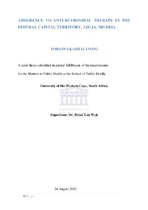Adherence to anti-retroviral therapy in the federal capital territory, Abuja, Nigeria
Abstract
Background Nigeria accounted for 2.95 million of the 22 million people globally living with HIV in 2008. In 2010, the HIV prevalence increased to 3.1 million, with 1.5 million people requiring anti-retroviral treatment (ART). ART is effective if patients adhere to treatment (taking 95% or more of drugs as prescribed) over a sustained period. Taking less than 95% of the medication can lead to drug resistance and treatment failure, which have dire individual and public health consequences. This study described adherence to ART and the factors that constrain and motivate adherence among patients on ART at the University of Abuja Teaching Hospital in the Federal Capital Territory (FCT), Nigeria. Methodology An observational, descriptive and analytical, cross-sectional survey of adherence among 502 adult ART patients (254 women and 248 men) from the University of Abuja Teaching Hospital was conducted. I collected sociodemographic and clinical characteristics of participants, and barriers and facilitators to adherence. For the prescription refill data, I utilized the updated pharmacy refill records from the ART dispensary. Bivariate and multivariate analysis was performed to analyse the factors that influence adherence to ART. Results Participants in this study had been on therapy for a mean of 43±27 months. Total optimal self-reported adherence over the previous three days (not missing a dose, taking correct doses in the correct frequency and correct schedule) was 53.6%, compared with 62.5% adherence calculated by prescription refill. However, most
(80.3%) participants achieved virologic suppression at a level of <400 copies/μl3. Reported barriers to adherence were: forgot (43%); travelled away from home (21%); ran out of medication (16%); busy at work (13%); lack of food (5%) and medication snatched by armed robbers (2%). Self-reported adherence over the previous three days was positively associated with age and viral load. Younger respondents (under 30 years) were 3 times more likely to adhere to their regimen
compared with those older than 30 years (OR = 2.5; 95% CI = 1.26-4.61; p =

